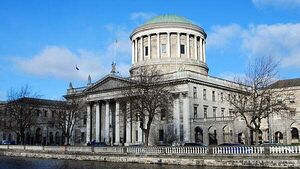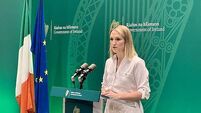High Court rejects challenge to presidential election nomination rules on eve of polling day

High Court Reporters
On the eve of Presidential polling day, a last-minute bid for a High Court judicial review of the nomination process has been refused leave, and costs have been awarded against unsuccessful hopeful Dr Cora Stack, who the court found had made "entirely baseless" and "unstateable" claims.
Dr Stack, a maths lecturer, had sought permission to challenge what she termed the "unlawful blocking" by political parties of her and other Independent candidates from contesting the election, which she said turned it into a "complete farce".
Dr Stack took the action against the Attorney General, Ireland, the Minister for Local Government and Heritage, the Presidential Returning Officer and Tánaiste Simon Harris.
At the High Court on Thursday, Mr Justice Mark Heslin rejected Dr Stack's submission that the nomination process was "unconstitutional, unfair and undemocratic and contrary to the express and implied provisions of Bunreacht na hÉireann".
Dr Stack also sought a declaration that the "direction of Tánaiste Simon Harris instructing all Fine Gael councillors nationwide to block independent candidates from being nominated was unlawful and unconstitutional".
She had sought an injunction requiring the nomination process to be conducted "fairly, lawfully and constitutionally" and requested an order restraining the State respondents from "proceeding with the current defective process".
The process demands that aspiring candidates must secure nominations from either 20 members of the Oireachtas or the support of four local authorities.
Mr Justice Heslin said Dr Stack's complaint that she could not access 20 Oireachtas nominations was "not arguable" as she had not put forward any evidence before the court of her efforts to do so.
He noted that there were also more than 20 Independent TDs in the Oireachtas that could have provided her with a route to nomination.
He said Dr Stack had not provided evidence of "even the most basic matters" and that there was no evidence that a single councillor had either proposed or seconded her.
Mr Justice Heslin said that Dr Stack's claim that councils curtailing potential candidates' presentations to "five minutes" was a denial of fair opportunity could not be laid at the door of the named respondents because it was entirely up to each council to make provisions regarding the scheduling and running of meetings.
The judge noted that no councils were named as respondents.
Dr Stack had further submitted that multiple council meetings were "convened simultaneously on 15 September 2025 making attendance impossible".
Mr Justice Heslin said Dr Stack's assertion that the "unprecedented clustering" [of council meetings] on September 22nd 2025, pointed to "orchestration by central authorities" was entirely baseless.
He said that the fact that Dr Stack was only able to attend two council meetings did not breach her rights or break the law. He added that to say any wrongdoing occurred in this regard was an "unstateable" proposition.
He said if Dr Stack believed she was championing the sovereignty of the people, "in substance, the applicant's claim utterly ignores the will of the people as currently expressed in the constitution and in statute".
The judge said Dr Stack was seeking a change in the law "so as to make it easier for her to secure a nomination".
Mr Justice Heslin said that any reform to the nomination process was a political matter to be decided by the people and their elected representatives and this would have to be approved in a referendum.
He said the courts did not have the power to "make" law" as its role was to "interpret and administer" the law.
Mr Justice Heslin then refused the application for leave for the review and awarded costs to the State, which was represented by Francis Kiernan BL.




